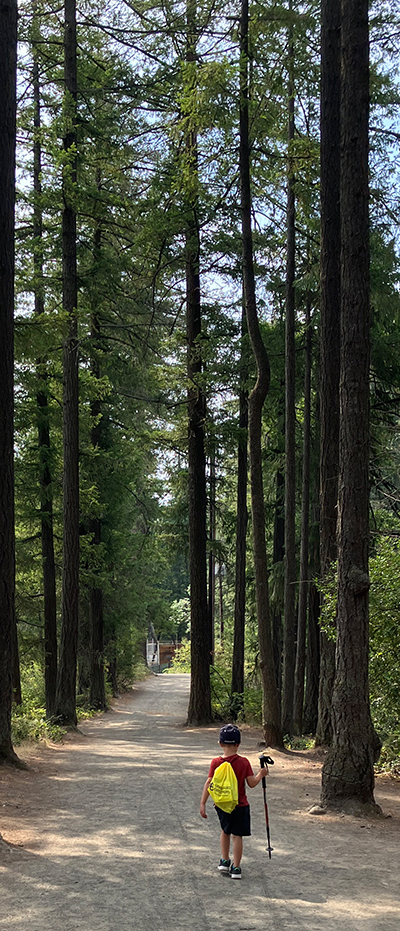Joy & Confidence Through Vulnerability
By Heather Quackenbush, Washington State H&V
My husband’s family, including my brother-in-law who is a therapist, loves to debate deep topics. This means I walk out of every family get-together with my head spinning so full of ideas and perspectives that it rivals my stomach’s capacity after Thanksgiving dinner. One name that always surfaces in these discussions is Brené Brown. You may know her work as a famous researcher on vulnerability, shame, and empathy. I recently had the opportunity to read her book, Daring Greatly. It offers distinctive applications to our work at Hands & Voices and as parents of children who are deaf and hard of hearing. Through studying this book, my perspective has shifted, and my confidence and joy have been boosted on this journey.

Why Vulnerability?
The first part of Daring Greatly focuses on our personal vulnerability. Initially, vulnerability may seem completely opposite to the principles of confidence, leadership, joy, and fulfillment. However, Brown has discovered through two decades of research that vulnerability is critical to the ‘wholehearted’ life. This is a life full of courage; a life truly lived to the fullest of our capacity. It is the life that brings the greatest satisfaction and joy we can find. Vulnerability is crucial simply because, as Brown states, “We can’t opt out of the uncertainty, risk, and emotional exposure that’s woven through our daily experiences. Life is vulnerable.” Embracing vulnerability is something that we all need to practice; vulnerability is part of being human.
How Does this Apply to Hands & Voices?
The central part of Daring Greatly explores vulnerability in organizations. Brown has found that vulnerability within groups begets creativity, innovation, and learning. On the other hand, shame and blame beget disengagement. Organizations that create a shame-resistant culture “…nurture folks who are much more open to soliciting, accepting, and incorporating feedback. These cultures also nurture engaged, tenacious people who expect to fail; to try and try again to get it right–people who are much more willing to get innovative and creative in their efforts.” That is the growth-mindset culture we desire. That is the culture I see in Hands & Voices as leaders introduce new programs and dare to be different than any other family support system. The core of Hands & Voices is all about supporting families, and support cannot happen without connection, trust, and vulnerability. As Brown said, “When it comes to vulnerability, connectivity means sharing our stories with people who have earned the right to hear them–people with whom we’ve cultivated relationships that can bear the weight of our story.” At Hands & Voices, we are all about sharing stories. We are about building connections and community. We need the kind of vulnerability described in Daring Greatly to truly accomplish our mission.
How Does this Apply to Being a Parent of Children who are Deaf and Hard of Hearing?
The last chapter of Daring Greatly focuses onparenting. Never have I felt so seen and yet uncomfortable in my parenting journey as I did while reading this chapter. Parenting opens you up to vast amounts of vulnerability; parenting a child who is deaf or hard of hearing only compounds that feeling. Brown explored the themes of belonging, shame resilience, hope, and worthiness. These issues weigh heavily on me when it comes to my children. I hear the worries of the families I work with echoed in that chapter. Yet Brown gives us all hope: she notes that good parenting can be found in simply engaging with our children. That looks like “…sitting down with children and understanding their worlds, their interests, and their stories. Engaged parents can be found on both sides of the controversial parenting debates. They come from different values, traditions, and cultures. What they share in common is practicing the values.” We see that in families from across all communication modes as well. This is exactly what Hands & Voices supports, “What works for your child is what makes the choice right.”tm The goal in parenting is not the decision made, but the engagement before, during, and after that decision. Thankfully, that is achievable regardless of the family location, communication method, or circumstances.
Our deaf and hard-of-hearing children can build their resilience to shame and learn to embrace vulnerability by following our example. Our engagement and guidance can give the gift of wholehearted living. Our children can have the greatest joy possible. And we are the ones to make it possible. I highly recommend reading Daring Greatly–not only for your own life and the goal of reaching wholeheartedness, but for your children, too. May we all have the joy and confidence that comes from vulnerability. ~
Editor’s note: Quotes are taken from Daring Greatly by Brené Brown, pages 43, 64, 160, and 237. The author is a Parent Guide with the Washington Chapter completing the L2L cohort for 2024-25.